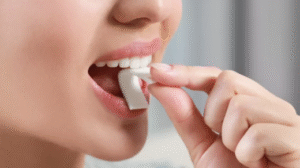
Keeping your mouth healthy takes more than just brushing twice a day. Dentists often recommend simple additions to daily routines that can make a big difference. One such addition is xylitol chewing gum.
Xylitol is a natural sugar alcohol found in fruits and vegetables. Unlike regular sugar, it doesn’t feed harmful bacteria in the mouth. This makes it a powerful tool in preventing cavities and improving overall oral health.
Role of xylitol in preventing tooth decay
Tooth decay begins when bacteria in your mouth digest sugars and release acids. These acids wear down the enamel and lead to cavities. This is where xylitol stands out.
Xylitol cannot be fermented by cavity-causing bacteria. When these bacteria encounter xylitol, they fail to produce acid and eventually die off. This shift in the mouth’s environment makes tooth decay less likely.
Xylitol chewing gum becomes a simple preventive tool. By chewing after meals, you reduce acid attacks and support the natural repair of enamel. Over time, this helps lower the risk of future cavities.
Xylitol chewing gum supports daily oral hygiene
Daily oral care is about consistency. Brushing and flossing remain essential, but xylitol gum adds another layer of defense.
When you chew xylitol gum, it stimulates saliva flow. Saliva plays a key role in washing away food particles and balancing mouth acidity. This means you’re not just freshening your breath—you’re actively helping your mouth clean itself.
The xylitol chewing gum works well between meals and after snacks, especially when brushing isn’t possible. It’s an ideal solution for people on the go or those who want to boost their oral care routine with minimal effort.
Dentists trust xylitol for safer sugar-free alternatives
Many sugar-free gums use artificial sweeteners that may not benefit your oral health. Xylitol, however, is backed by science and supported by professionals in dental care.
Dentists prefer xylitol over aspartame or saccharin because it not only avoids feeding bacteria but also actively discourages their growth. It’s rare to find a sweetener that does more than just reduce sugar.
Xylitol chewing gum is safe for both children and adults. It’s often recommended by dentists as a step toward healthier habits, particularly for those who struggle with frequent cavities or dry mouth.
Xylitol chewing gum reduces harmful bacteria in the mouth
Your mouth is home to hundreds of bacterial species. Some of these bacteria, like Streptococcus mutans, are major culprits in cavity formation.
Xylitol disrupts their ability to stick to your teeth and feed on sugars. Over time, the number of harmful bacteria drops, creating a healthier balance in your mouth.
Chewing xylitol gum after meals helps maintain that balance. It’s not about replacing brushing—it’s about giving your teeth an extra line of defense against the invisible threats lurking between meals.
Conclusion
Xylitol chewing gum is more than just a sweet treat. It’s a dentist-approved addition to your oral care toolkit. From fighting bacteria to encouraging saliva and protecting enamel, xylitol offers benefits that go far beyond flavor. It supports your efforts, whether you’re at work, on the move, or simply enjoying a snack.
